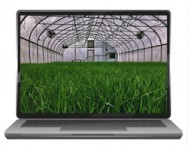Managing Soil Nitrogen in Winter High Tunnels
Event Details
Date
March 5, 2021
Time
12:00pm - 1:30pm
Location
Online via Zoom
Host
CCE Cornell Vegetable Program
Caitlin Tucker
573-544-4783
email Caitlin Tucker
Event Registration

To meet the year-round demand for locally produced food, vegetable farmers have embraced protected agriculture to extend their growing season, improve yields, and enhance crop quality. However, a statewide survey found that after several growing seasons, farmers struggle to maintain productivity due to challenges in long term soil health and fertility management. Cornell Cooperative Extension is exploring practices that high tunnel growers can adopt to better manage soil fertility and improve soil health:
- Including winter cover crops in high tunnel tomato rotations as a way to scavenge leftover nitrogen and/or fix nitrogen. In turn, this could lead to less fertilizer use and result in higher crop health, yield, quality, and profitability. As part of this work, we are investigating suitable cover crop species, seeding dates, and seeding rates.
- Optimizing winter nitrogen management for spinach production. High tunnel spinach can survive Northern New York winters without supplemental heat, but the nitrogen needs of this leafy crop during the short days of winter are not well understood. Given that organic fertilizers require warm soils to mineralize the nitrogen into a form plants readily use, farmers apply high levels of nitrogen to ensure crop growth. By establishing appropriate nitrogen rates and sources, this project could increase profitability by reducing inputs while also improving soil sustainability.
Grab your lunch and join us for a virtual conversation on Friday, March 5, 2021 from 12:00pm - 1:30pm to hear our project updates and research results.
Questions can be directed to Caitlin Tucker.
Register now!

Upcoming Events
2026 Northeast Extension Fruit Consortium Winter Webinar Series
February 4, 2026 : Management of Up and Coming Strawberry Diseases in the Northeastern United States
Session 1: Management of Up and Coming Strawberry Diseases in the Northeastern United States
February 11, 2026 : Kiwiberry Production in the Northeast
Session 2: Kiwiberry Production in the Northeast
February 18, 2026 : Heat Mitigation- Sunburn and Fruit Coloring
Session 3: Heat Mitigation- Sunburn and Fruit Coloring
February 25, 2026 : The Dating Game- Updates in Lepidopteran Mating Disruption
Session 4: The Dating Game- Updates in Lepidopteran Mating Disruption
March 4, 2026 : USEPA Endangered Species Act Strategies and Pesticide Use
Session 5: USEPA Endangered Species Act Strategies and Pesticide Use
March 11, 2026 : Practical Drought Management for Fruit Growers
Session 6: Practical Drought Management for Fruit Growers
Managing the Invasive Swede Midge Webinar
March 6, 2026 : Managing the Invasive Swede Midge Webinar
Swede midge is an invasive fly that causes serious economic losses to brassica crops. Due to its small size and hidden feeding habits, swede midge is often called an "invisible pest" and damage may be misdiagnosed. In this webinar, we will review the swede midge life cycle and crop damage symptoms, current management recommendations, new research findings, and highlights from on-farm case studies with a focus on organic management.
New Farm Manager Skills Day - Get the Tools You Need to Grow Your People (Hudson Valley)
March 10, 2026 : New Farm Manager Skills Day - Get the Tools You Need to Grow Your People
Millbrook, NY
Are you moving into a supervisory farm management role this season and want to get off to a good start? Are you an experienced manager who wants to connect with other "people" managers and work on your skills? This one-day workshop is for you!












































